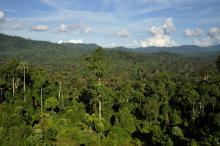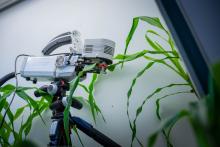A project led by UBC and Indiana University (IU) plant evolution expert Loren Rieseberg has been awarded $8 million from the US National Science Foundation to study economically important and evolutionarily interesting plant species.
The project will investigate the largest family of flowering plants, which includes sunflowers, safflowers, and lettuce. The four-year award will be disbursed via the IU Bloomington plant biology team and distributed to collaborators at five partner institutions.
"This project will have a major, lasting impact on both crop and weed science through the production of permanent, publicly available genomics resources," says Rieseberg, Canada Research Chair in Plant Evolutionary Genomics in the department of Botany at UBC, and jointly appointed to IU.
"All results will be disseminated via publication in peer-reviewed journals, presentations at national and international meetings, and the resulting data will be made publicly available via deposition in freely-accessible, online databases."
Of particular interest to Rieseberg and his group are genetic changes in crop species and weeds that have led to similar changes in form, for example, height or bushiness. If these changes are guided by the same genes, or some of the same genes, agricultural biotechnologists might learn to imbue other plant species with the same properties.
Last, the researchers will look at how the duplication of whole sets of chromosomes may have influenced the evolution of Compositae species. Many plants are famously able to tolerate genome duplication. Changes in chromosome number in humans, by contrast, usually leads to cell death or severe developmental defects.
Zhao Lai, assistant scientist in the IU Bloomington Department of Biology and staff scientist at the IU Center for Genomics and Bioinformatics, is a co-principal investigator on the project. Richard Michelmore and Kent Bradford (University of California at Davis), Richard Kesseli (University of Massachusetts Boston), John Burke and Steven Knapp (University of Georgia), and David Still (California State Polytechnic University) are also co-principal investigators on the project.
Musqueam First Nation land acknowledegement
We honour xwməθkwəy̓ əm (Musqueam) on whose ancestral, unceded territory UBC Vancouver is situated. UBC Science is committed to building meaningful relationships with Indigenous peoples so we can advance Reconciliation and ensure traditional ways of knowing enrich our teaching and research.
Learn more: Musqueam First Nation
Faculty of Science
Office of the Dean, Earth Sciences Building2178–2207 Main Mall
Vancouver, BC Canada
V6T 1Z4


